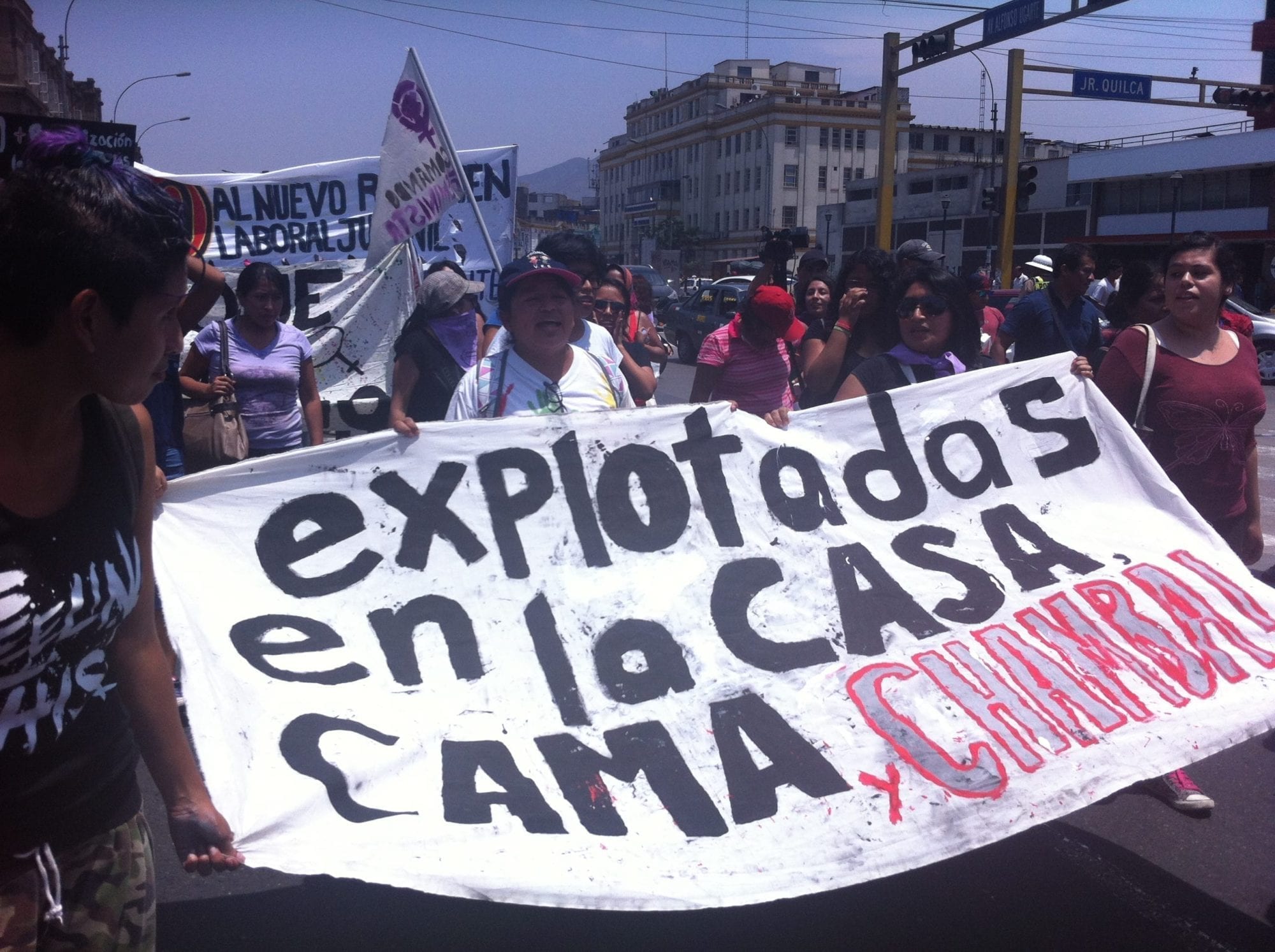
Jan 28, 2015
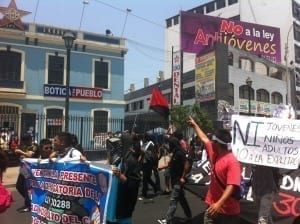
Credit: Solidarity Center/Luis Mendoza
Workers in Peru are celebrating the repeal this week of a labor law that targeted young workers, a huge victory that followed weeks of street demonstrations and protests by working people and their unions.
Peru’s Congress voted 114–91 to repeal the law, which reduced salaries and benefits for workers under age 25. A recent poll showed only one-fifth of Peruvians supported the law.
“They never asked young people what they thought,” says one worker, who took part in the protests.

The secretary general of the Topitop textile union featured on the cover of Peru’s La Republica as workers celebrated repeal of the labor law.
Ultimately, workers say, the law would not only have harmed young workers.
Jorge, an apparel worker at a Topitop factory that employs 2,400 workers, puts it this way: “What the company wants is to fire us and replace us with younger workers without any benefits.” Adds Abel, also a garment worker: “What we are doing is defending ourselves, our children and our future grandchildren.”
Young labor activists from the textile and apparel, export-oriented agriculture and mining sectors took vocal positions against the law and helped lead protests. The Solidarity Center, with support from the U.S. Department of Labor, works closely with young Peruvian worker activists to help them analyze their labor rights; develop leadership, negotiating and organizing skills; and learn to advocate for their issues.
As students, young workers and the Peruvian labor movement look toward upcoming campaigns to push for approval of a general labor law, an increase in the minimum wage and the repeal of another recent law that makes it easier for employers to conduct mass layoffs, the Solidarity Center plans to continue to work alongside union allies at the workplace, federation and confederation level to identify lessons learned from this experience and ensure that young workers can continue to provide leadership in union building and policy campaigns.
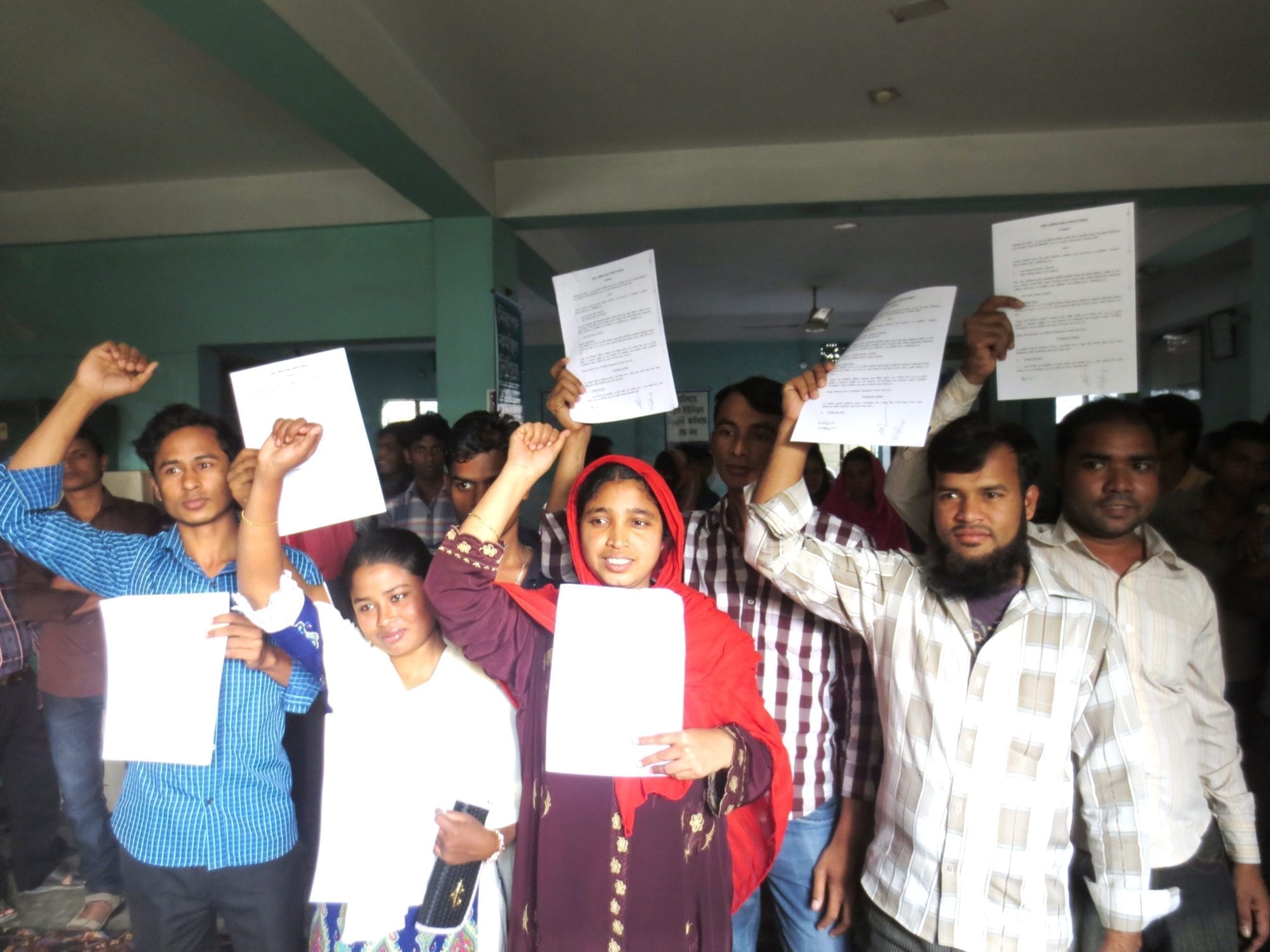
Jan 27, 2015
Standing strong in the face of a long and difficult struggle for their rights, Bangladesh garment union leaders at five factories in the East-West Industrial Park Ltd. group negotiated collective bargaining agreements in recent days that include increases in the food allowance, improvements in canteen facilities and provisions for union leaders to assist members.
The five union factories are affiliated with the Bangladesh Independent Garment Workers Union Federation (BIGUF), which helped negotiate an earlier agreement in May 2014 to resolve hostilities and lay the groundwork for good-faith bargaining. The Solidarity Center provided legal and other technical assistance to workers throughout the process.
Hamidul Islam, general secretary of the Rumana Fashion Ltd. Workers Union, which represents workers at one of factories in the group, said that despite the challenges leading up to the victory, “This is really just a starting point (for our union). We will be able to help workers the most if we can continue to discuss with the management about how to create a better working environment.”
Further, he said, “the days would have been harder and longer had it not been for the help of BIGUF and the Solidarity Center. It is still hard to believe that we are one of the few factories that have a signed collective bargaining agreement in the country’s entire garment industry. But we know it’s because we are strong and stuck together.”
Shahera, general secretary of Fashion Suit & Trousers Ltd. who was also involved in negotiations, said, “A union is about workers claiming their rights by being together, and I want to encourage other unions not to give up.”
However, workers who formed unions at five other factories in the group are still working to gain legal recognition by authorities.
“We are very encouraged by the progress that’s been made at the East-West group and will help the union leaders now work to implement the collective bargaining agreements in the factories,” said Raju, BIGUF acting general secretary.
“However, we continue to be concerned about the trade union registration process and that workers who have worked hard to organize their factories are having their unions unfairly rejected by the government.”
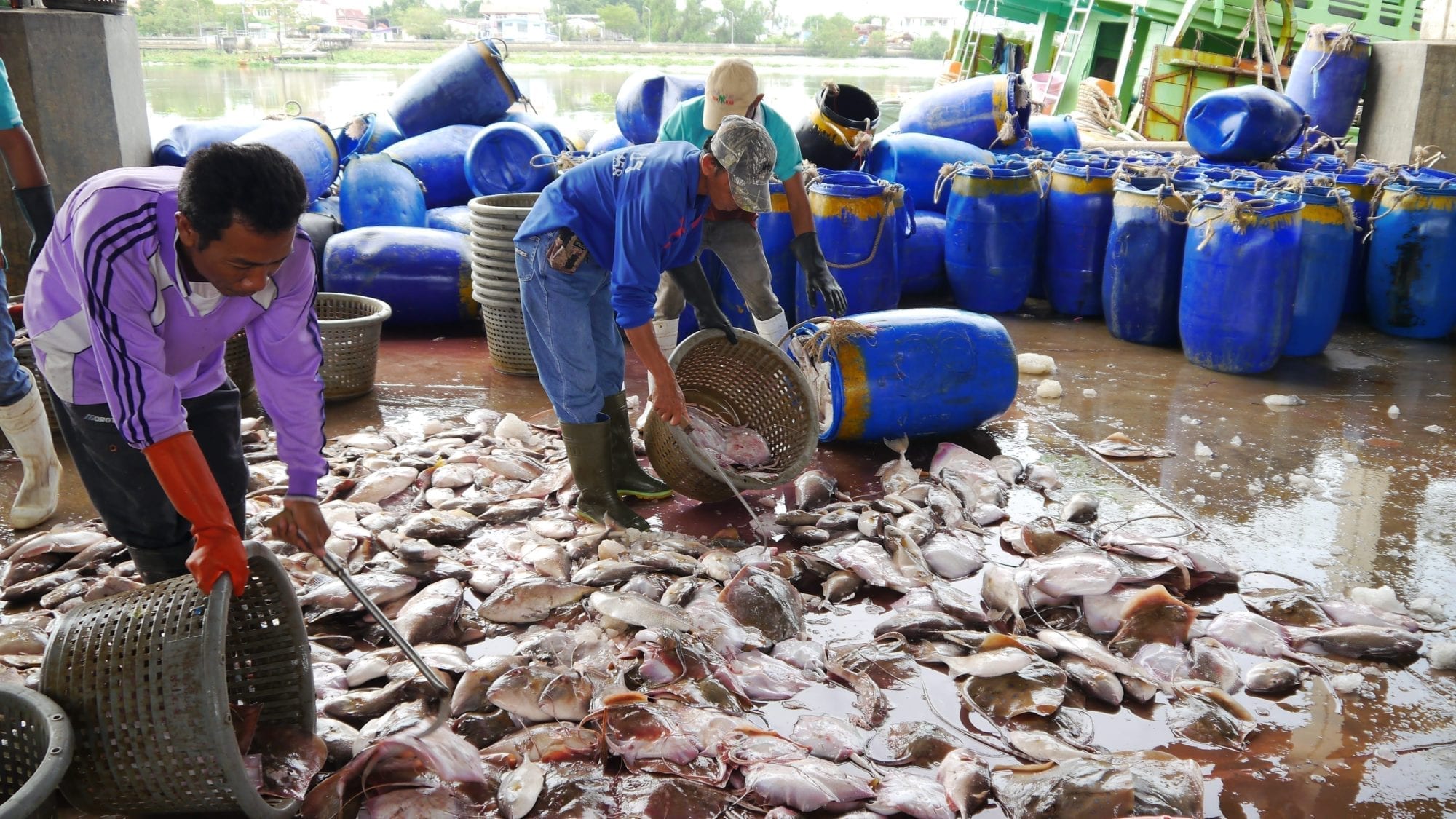
Jan 15, 2015
Some 45 labor groups and other nongovernmental organizations (NGOs) sent a letter to the Thai prime minister yesterday protesting a proposed plan to use prison labor on fishing boats.
Saying the plan threatens the human rights of prisoners and likely goes against the International Labor Organization’s convention on forced labor, the letter states:
“The Thai government should recognize the only way to address the labor shortage on Thai fishing vessels is to make enforcement of labor laws on fishing boats a priority and improve conditions so that the sector can attract workers to voluntarily work on the boats.”
Thailand’s move comes despite worldwide attention on abuses in the Thai fishing industry. In June, the U.S. State Department downgraded Thailand in its annual Trafficking in Persons Report, which could subject Thailand to sanctions, among them the withholding or withdrawal of U.S. non-humanitarian and non-trade-related assistance.
In the letter, the organizations, which include the International Trade Union Confederation and the AFL-CIO, state that if the program goes forward, they will raise concerns with the U.S. State Department as it prepares its 2015 assessment of Thailand’s performance on trafficking in persons.
Last year, a Guardian series documented the horrors endured by migrant workers who often are tricked by labor recruiters and sold into bondage. Estimates of migrant workers in Thailand range from 200,000 to 500,000. In 2013, an ILO survey of nearly 600 workers in the Thai fishing industry found that almost none had a signed contract, and about 40 percent had wages cut without explanation. Children were also present aboard fishing boats.
Forced prison labor is not the solution to Thailand’s worker rights abuses, the organizations say in the letter to Prime Minister Prayut Chan-o-cha.
“Simply replacing vulnerable migrant workers with released prisoners will not solve the abusive working conditions and many other problems present in the Thai fishing industry.”
Thailand is the world’s third-largest seafood exporter, and its fishery production accounts for $8 billion annually.
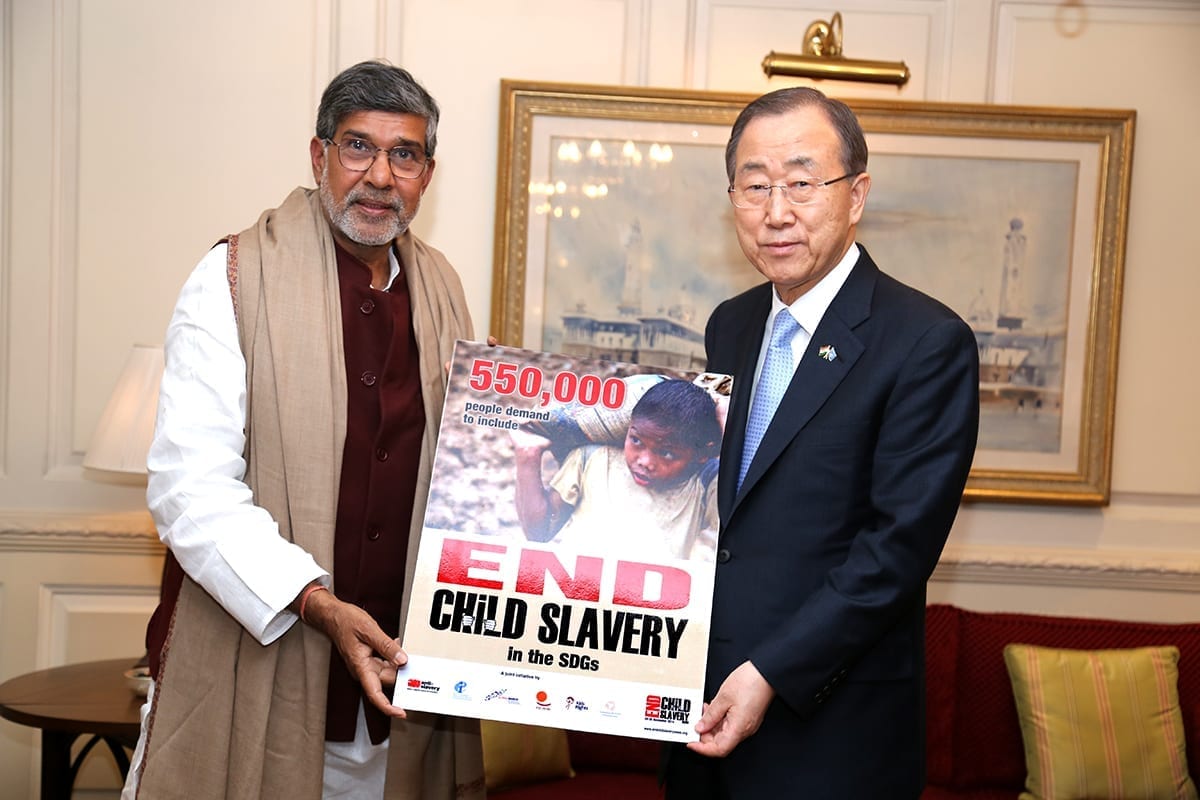
Jan 13, 2015
In an historic meeting, Nobel Peace Laureate Kailash Satyarthi delivered a global petition on child labor to United Nations (UN) General Secretary Ban Ki-Moon in New Delhi, India, yesterday. More than 550,000 people around the world signed the petition urging the UN to make abolition of child labor a key part of the world body’s Sustainable Development Goals (SDGs), now under discussion.
“The most shameful commentary of today’s society is that slavery still exists, and our children are the worst sufferers,” Satyarthi said in an address at the event. “There cannot be any excuse for this heinous crime against humanity. There must not be any delay in ensuring their freedom. We have to act now and create a future where all children are free to be children.”
Last November, the Global March Against Child Labor, a coalition of unions and child rights organizations in more than 140 countries, which includes the Solidarity Center, launched End Child Slavery Week, to focus on improving the Sustainable Development Goals. The centerpiece of the campaign involved collecting signatures for delivery to the UN secretary general.
The petition included the exact text for inclusion in the “Outcome Document” of the Open Working Group on Sustainable Development Goals:
“Take immediate and effective measures to eradicate forced labor, secure the prohibition and elimination of the worst forms of child labor including recruitment and use of child soldiers and child slavery, and, by 2025, end child labor in all its forms.”
Satyarthi, who in 1998 created the Global March Against Child Labor as part of his tireless efforts to end child labor, also discussed with UN officials at the event further steps for ensuring the rights of children globally. Satyarthi was awarded the Nobel Peace Prize in 2014 for his decades of often dangerous work in rescuing child laborers and providing them with safe havens.
It’s not too late to sign the petition. In the United States, the social mobilization organization CREDO partnered with the Solidarity Center to create a successful petition campaign.
Sign now!
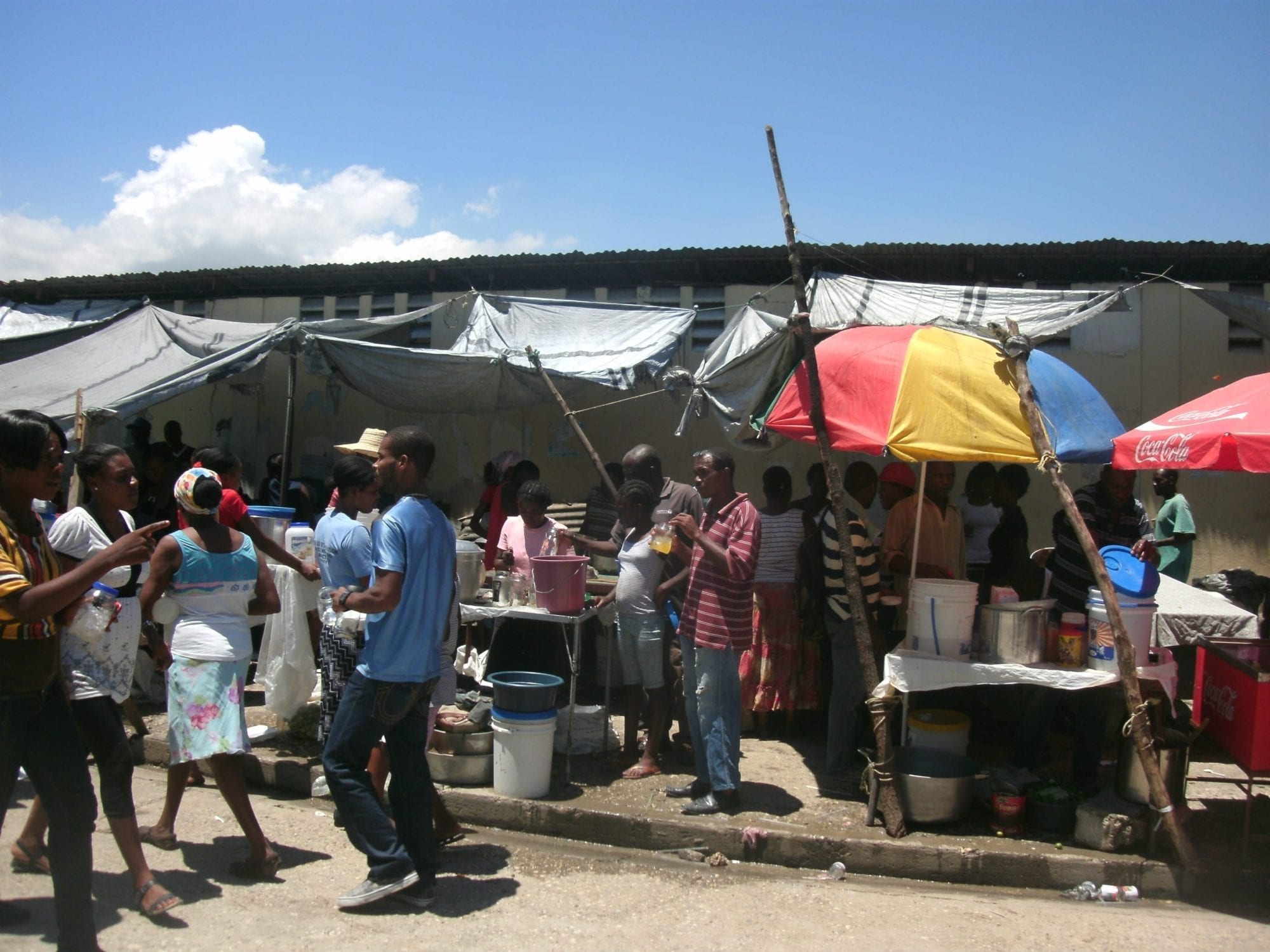
Jan 9, 2015
Five years after the catastrophic earthquake in Haiti, workers are still struggling to pay for transportation, food and housing, as the cost of living rises exponentially while wages fail to keep pace.
In recent discussions with export apparel workers in Port-au-Prince, Haiti’s capital, the Solidarity Center found that workers may pay nearly half their daily wage on two daily meals. Sending a child to school can absorb most of their monthly pay.
Elmerome, who makes T-shirts and is paid 225 Haitian gourdes ($4.81) per eight-hour day, says even though his wages have risen from 125 gourdes per day before the earthquake, food for himself and his child every day costs 500 gourdes, or more than twice his daily income. In 2013, he spent about 400 gourdes a day on food. Meanwhile, his child’s education costs run about 5,000 gourdes a month.
Like all workers whom the Solidarity Center interviewed, Elmerome is a member of a union, a factor he attributes to improving his working conditions. He says the Centrale National des Ouvriers Haïtiens (CNOHA) union has “helped fight against discrimination, suspensions and dismissals, and “gives workers a voice.” He sees freedom of association as the most important element for Haitian workers seeking to improve their working conditions. And echoing other factory workers interviewed, he says many workers fear joining a union because of employer harassment, including the threat of being fired.
The Solidarity Center held these recent informal discussions as a follow-up to a study it conducted in 2014 to reassess the cost of living for export apparel workers in Port-au-Prince. “The High Cost of Low Wages in Haiti” concluded that, based on a standard 48-hour work week, Haitian workers should be paid at least 1,006 gourdes per day to adequately provide for themselves and their families. But like Elmerome, workers are generally paid between 225 gourdes (the minimum wage for export factories) and 300 gourdes a day or more if they are piece-rate workers. Further, the report says,
“Despite growth at the industry level, export apparel workers remain impoverished …. Companies that source from Haiti benefit from inexpensive labor costs, as well as lax enforcement of labor laws in an industry that is rife with worker rights abuses.”
Another factory worker, Widnise, told the Solidarity Center that she makes 225 gourdes a day and spends nearly half of that—110 gourdes each day—on food and transportation. Even with two people working in her household, she says, it is difficult to survive. Her rent is 20,000 gourdes a year.
In 2013, Haitian workers and their unions waged rallies and protests to demand that the daily minimum wage be increased to 500 gourdes for export apparel workers, but the government raised it to only 225 gourdes, effective last June.
Since then, Haitian unions have sought to secure improvements for workers through labor-employer discussions with the government on reforming the current labor code, boosting social protections and reviewing wage levels. The current labor code has not been updated in more than 28 years, and union leaders say stronger labor laws and improved social protections could go a long way to address many of the problems facing Haitian workers and their families.
In the apparel sector, Haitian unions are actively participating with employers in the Social Dialogue Table launched in early 2014. Haitian government representatives from the Ministry of Social Affairs and Labor Ministry participate as observers, along with other national and international organizations, including the Solidarity Center, the CTMO-HOPE Commission and the nonprofit, Better Work-Haiti. Union leaders say this process can potentially pave the way for improved workplace conditions, especially respect for worker rights.
“Our discussions with Haitian workers underscore a critical truth about the recovery effort: Subsistence wages have not helped workers surmount this disaster, much less allowed them to prepare for the next environmental or economic shock,” said Shawna Bader-Blau, Solidarity Center executive director. “For hardworking Haitians to live with dignity—and for Haiti to develop an economy that works for its people—fair wages are essential.”
The January 12, 2010, earthquake killed more than 200,000 Haitians and left another 1.5 million homeless. The disaster was followed by a string of tropical storms and a cholera epidemic that killed at least 8,000 people. Within days of the earthquake, the Solidarity Center dispatched regular truckloads of lifesaving emergency aid to Haiti from its field office in the neighboring Dominican Republic and carried out numerous aid and relief projects, together with allies like the American Federation of Teachers and TransAfrica. The report, “Workers Helping Workers Recover and Rebuild,” details the full range of the Solidarity Center’s multiyear relief and rebuilding effort in Haiti.







